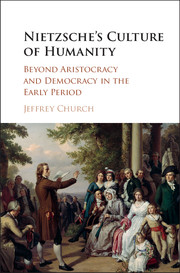Book contents
- Frontmatter
- Dedication
- Contents
- Preface
- List of abbreviations
- Introduction
- PART I The Foundation of Culture in the Early Nietzsche
- Part II Two Concepts of Culture in the Early Nietzsche
- PART III The Means to Culture in the Early Nietzsche
- 7 The Education to Culture
- 8 The State, Liberalism, and Culture
- PART IV The Significance of the Early Period
- Bibliography
- Index
7 - The Education to Culture
from PART III - The Means to Culture in the Early Nietzsche
Published online by Cambridge University Press: 05 October 2015
- Frontmatter
- Dedication
- Contents
- Preface
- List of abbreviations
- Introduction
- PART I The Foundation of Culture in the Early Nietzsche
- Part II Two Concepts of Culture in the Early Nietzsche
- PART III The Means to Culture in the Early Nietzsche
- 7 The Education to Culture
- 8 The State, Liberalism, and Culture
- PART IV The Significance of the Early Period
- Bibliography
- Index
Summary
In the previous part, we examined Nietzsche's view of the good community – culture – and saw that for Nietzsche it is good because it fosters the best life for humanity. As it turns out, Nietzsche developed two concepts of culture – a national and a cosmopolitan concept of culture – in his early period work. Rather than being contradictory, I argued that these two concepts complemented one another. Nietzsche's synthesis of these two concepts represents the resolution of the founding debate about culture between Kant and Herder. As in his ethical theory, so too here the contradictions are resolved through the life, personality, and works of the exemplary individual.
We have traversed the foundation of Nietzsche's ethics (Part I), the nature and character of his view of culture (Part II), and now turn to the final element of Nietzsche's early theory, namely, the means for realizing culture (Part III). In this part, we must examine Nietzsche's account of how his ideal could be realized in the modern age, because Nietzsche himself was quite aware of the inadequacy of “ideal theory.” Nietzsche believes that the “hardest task” is to “say how … one can proceed towards so extravagant a goal [or ideal] through a practical activity.” Without completing this “hardest task,” “one might otherwise think [the ideal] nothing but an intoxicating vision granted us only for moments at a time, and then leaving us all the more painfully in the lurch and prey to an even deeper dissatisfaction” (UM.3.5). As we will see in this chapter, Nietzsche celebrates the “educational ideal” (Bildungsideal) of a “classical education” (klassische Bildung), but he worries that it is merely “floating in the open air … not at all able to grow forth out of the soil of our educational apparatus [Erziehungapparate],” and so a “pretentious illusion” (FEI 61). Unlike his later period work, in which Nietzsche is much more vague about the practical means to achieve his ideals, in his early period work Nietzsche devoted a good deal of effort to considering the means.
Nietzsche discusses two means in his early period: education (this chapter) and the state (Chapter 8). Education is in Nietzsche's mind the most important vehicle for culture, and he delivered a series of lectures on this topic, On the Future of Our Educational Institutions, which I analyze in detail in this chapter.
- Type
- Chapter
- Information
- Nietzsche's Culture of HumanityBeyond Aristocracy and Democracy in the Early Period, pp. 175 - 205Publisher: Cambridge University PressPrint publication year: 2015

